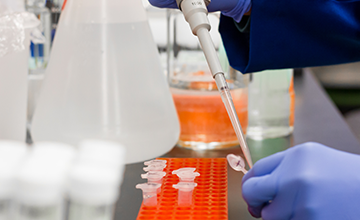The synthetic biology industry may experience explosive growth
release date:2023-03-27 view count:2297
Under the guidance of the national macro strategy, the research and industrial development of synthetic biology have advanced rapidly in recent years, and several relevant research centers and key laboratories have been established. At the same time, several major synthetic biology projects in the field have received financial support. With the support of policies, in addition to rapid progress in basic research, the number of enterprises has also grown rapidly. Up to now, there are 62 synthetic biology start-ups in China, mainly in Tianjin, Shenzhen, Shanghai, Hangzhou and other places.
At the recently concluded two sessions of the National People's Congress, Ma Yanhe, deputy to the National People's Congress and director of the Chinese Academy of Sciences Tianjin Institute of Industrial Biotechnology, disclosed the latest progress of the project of "artificial synthesis from carbon dioxide to starch". The project has been built into a small-scale pilot plant, and artificial synthetic starch has taken another step towards industrialization. Behind this is the repeated attempts of synthetic biologists to "design synthesis test learning" for more than ten years.
This year's National People's Congress and National People's Congress, multiple representative members provided suggestions and suggestions on synthetic biotechnology and industrial development. In 2022, the 14th Five Year biobased economy Development Plan issued by the National Development and Reform Commission also mentioned "synthetic biology" several times. According to the data from the scientific innovation big data analysis platform, Rui Beast Analysis, since 2021, 92 domestic synthetic biology track companies have received financing, with a total amount of 28.978 billion yuan.
Standing at the forefront of policy and capital, the blueprint for the synthetic biology industry has been drawn, and it will also become a highly promising industry track.
Comprehensive application of synthetic biotechnology
"Synthetic biology is a purposeful and rational design, transformation and even re synthesis of biological systems with unnatural functions under the guidance of engineering ideas. It can not only explore the composition and regulation laws of life through design synthesis, but also design and transform artificial biological systems to meet the major needs of social development." Li Bingzhi, a professor of Tianjin University, introduced.
At the beginning of the 21st century, with the development of high-throughput gene sequencing and synthetic genome technology, the synthetic biology industry began to move towards an era of high-throughput and high automation. At the same time, the continuous upgrading and improvement of these technologies have also promoted the continuous development and progress of the synthetic biology industry, "said Pan Qing, Investment Director of Tianjin University Zhejiang Alumni Association Investment Company and Zhejiang Tianhua Technology Development Co., Ltd.
Although synthetic biotechnology is relatively cutting-edge, it has been widely applied in various fields such as biomedicine, material chemistry, agriculture, food, energy, and environmental protection.
"Biomedicine is one of the most widely used fields of synthetic biology." Li Bingzhi introduced that synthetic biotechnology can be used in drug production, medical diagnosis and treatment method development, involving disease diagnosis, vaccines, antibiotics, drugs, gene therapy, cell engineering and other products. American synthetic biologists have designed and constructed artificial yeast cells that can produce the antimalarial drug artemisinin, which can be called a major application model of synthetic biotechnology.
Materials chemistry is also a field where synthetic biotechnology is widely used. Synthetic biotechnology realizes the gradual substitution of biological routes to chemical routes in product manufacturing through system design and transformation. Synthetic biotechnology has the advantages of being more efficient, green, and low energy consumption.
In addition, in the agricultural field, synthetic biotechnology can be applied to improve crop yield and resistance; In the field of food, synthetic biotechnology can be used to synthesize amino acids, proteins, functional additives, etc. for food industry production; In the field of energy, synthetic biotechnology can be used to produce renewable energy such as biofuels, such as using microorganisms to synthesize biofuels or genetically modifying microorganisms to convert biomass into ethanol; In the field of environmental protection, synthetic biotechnology can be applied to environmental remediation and pollutant treatment.
Research and industrial development go hand in hand
China's synthetic biology industry has made significant progress in the past few years, and China has become one of the highly regarded markets in the global synthetic biology field, "said Pan Qing.
Pan Qing believes that since 2008, China's top-level strategic plan in the field of synthetic biology has been gradually strengthened. The "13th Five Year" National Science and Technology Innovation Plan lists synthetic biotechnology as a disruptive technology leading industrial change, and the "14th Five Year" biobased economy Development Plan in 2022 clearly lists synthetic biology as a key development direction.
Under the guidance of the national macro strategy, the research and industrial development of synthetic biology have advanced rapidly in recent years. From the approval of the Chinese Academy of Sciences to establish a key laboratory of synthetic biology by the Shanghai Institute of Life Sciences in 2008, to the support of the Ministry of Science and Technology of Tianjin and the Chinese Academy of Sciences to jointly build a national integrated biotechnology innovation center in 2019, a number of relevant research centers and key laboratories have been established in the past 10 years. At the same time, several major synthetic biology projects in the field have received financial support, and the national key research and development plan has set up "synthetic biology" key projects.
With the support of policies, in addition to rapid progress in basic research, the number of enterprises has also grown rapidly. "According to the industrial chain, synthetic biology enterprises can be divided into three levels of companies." Pan Qing introduced that the first is the tool level (also known as technology-based companies), which is mainly related to DNA, including sequencing, synthesis, storage, genome editing, etc; The second type is the software/hardware layer (also known as platform based companies), which combines artificial intelligence to build high-throughput and automation technology platforms, focusing on simulation design, strain construction, high-throughput testing, and intelligent feedback; The third is the application layer (also called product company), which uses synthetic biology technology to replace existing processes or develop new products, and develops them to the extent that they can be commercially applied.
At present, technology and platform based companies are mainly start-ups, and enterprises with scale are mainly product based companies, mainly including some enterprises that have been deeply involved in biological fermentation for years and have successfully transformed or added new pipelines through synthetic biotechnology, such as listed companies Anhui Huaheng Biotechnology Co., Ltd. and Shanghai Kaisai Biotechnology Co., Ltd., "Pan Qing said. As of now, There are 62 synthetic biology start-ups in China, mainly in Tianjin, Shenzhen, Shanghai, Hangzhou and other places.
Such rapid development momentum has also made the synthetic biology industry the darling of China's capital market in recent years. According to the statistics of SynBioBeta, the world's top synthetic biology "community", 1039 investment and financing events were completed in China's synthetic biology primary market from 2018 to 2022.
We still need to strengthen research and development and technological innovation
Yang Xianjin, Secretary of the Party Committee of Tianjin University, stated that with the breakthrough and transformation of underlying technologies, the synthetic biology industry will experience explosive growth, and the next 3-5 years will be a critical period for the development of the synthetic biology industry.
Every breakthrough in the underlying technology of synthetic biology will promote the leapfrog development of related industries. The wide application of synthetic biotechnology has also promoted the research and innovation in the field of synthetic biology.
Yang Xianjin said, "In the next 10 to 20 years, the application of synthetic biology may have a direct economic impact of US $2 trillion to US $4 trillion annually."
Many countries and regions have also drawn grand blueprints for the development of the synthetic biology industry. According to the Biomass Technology Roadmap of the United States, by 2030, bio based chemicals will replace 25% organic chemicals and 20% petroleum fuels; The EU's "Industrial Biotechnology Vision Plan" proposes that by 2030, biological based raw materials will replace 6% -12% of chemical raw materials, and 30% -60% of fine chemicals will be manufactured from biological based materials. China's "Fourteenth Five Year Plan" biobased economy Development Plan points out that we should promote technological innovation in synthetic biology, break through key technologies such as biological manufacturing strain computing design, high-throughput screening, efficient expression, and precise regulation, and orderly promote applications in new drug development, disease treatment, agricultural production, material synthesis, environmental protection, energy supply, and new material development.
"Although China's synthetic biology industry has made great progress in policy support, the number of enterprises, and application fields, it still faces some problems." Pan Qing pointed out that China's synthetic biology industry is still in the early stage of development in technology and market applications, and there are still technical bottlenecks in some fields, such as synthetic genomics, high-throughput sequencing, big data analysis, and other aspects still need to strengthen research and development and technological innovation.
In addition, due to the interdisciplinary nature of the synthetic biology industry, China currently lacks a professional talent team and interdisciplinary talent cultivation mechanisms. At the same time, the synthetic biology industry also needs further improvement in relevant policies and laws and regulations to promote its healthy development.
China's synthetic biology industry still needs to continuously improve its competitiveness and innovation capabilities in order to achieve higher levels of development.
- prev:无
- next:What kind of talents do IVD enterprises need?




